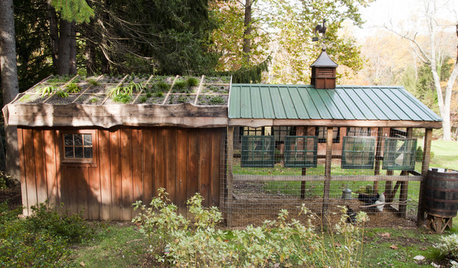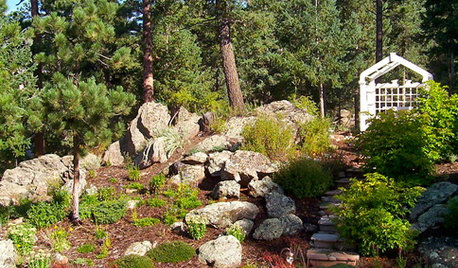Bones on any kind for soil or just chicken?
scarletdaisies
13 years ago
Related Stories

FARM YOUR YARDHouzz Call: Show Us Your One-of-a-Kind Chicken Coops
Do you have a fun or stylish backyard shelter for your feathered friends? Post your pictures and stories in the Comments!
Full Story
GARDENING GUIDESGardening Solutions for Heavy Clay Soils
What’s a gardener to do with soil that’s easily compacted and has poor drainage? Find out here
Full Story
GARDENING GUIDESThe Poop Scoop: Enrich Your Soil With Good Old Manure
Get over the ick factor already — this natural super-ingredient for soil has so many benefits, you'll wonder why you ever went chemical
Full Story
GARDENING GUIDESHouzz TV: Make a Worm Bin for Rich Soil and Happy Plants
A worm-powered compost bin that can fit under a sink turns food scraps into a powerful amendment for your garden. Here’s how to make one
Full Story
FARM YOUR YARDHow to Get Good Soil for Your Edible Garden
The nutrients in your soil feed the plants that feed you. Here are tips on getting it right — just in time for planting season
Full Story
GARDENING GUIDESHow to Pick a Mulch — and Why Your Soil Wants It
There's more to topdressing than shredded wood. Learn about mulch types, costs and design considerations here
Full Story
GARDENING GUIDESHow to Stop Worrying and Start Loving Clay Soil
Clay has many more benefits than you might imagine
Full Story
GARDENING GUIDESGrow a Beautiful Garden in Alkaline Soil
Got alkaline soil? Learn how to manage it and the many beautiful plants that will thrive in this ‘sweet’ soil
Full Story
GARDENING GUIDESHave Acidic Soil in Your Yard? Learn to Love Gardening Anyway
Look to acid-loving plants, like conifers and rhododendrons, to help your low-pH garden thrive
Full Story
PETSWorld of Design: Pampered Pets and Their 10 One-of-a-Kind Homes
Fall in love with these critters and their clever living spaces, from a cat playground in France to a chicken house in the U.S.
Full Story





brdldystlu
curt_grow
Related Professionals
Walnut Landscape Architects & Landscape Designers · Wheeling Landscape Architects & Landscape Designers · Alexandria Landscape Contractors · Allentown Landscape Contractors · Waterbury Landscape Contractors · Harrisburg Landscape Contractors · North Haven Landscape Contractors · Rochester Landscape Contractors · Salem Landscape Contractors · Wanaque Landscape Contractors · New Carrollton Landscape Contractors · Boone Decks, Patios & Outdoor Enclosures · Dearborn Decks, Patios & Outdoor Enclosures · Foothill Farms Decks, Patios & Outdoor Enclosures · San Diego Decks, Patios & Outdoor Enclosuresborderbarb
hortster
compostkate
scarletdaisiesOriginal Author
phytolacca
jonas302
Kimmsr
toxcrusadr
scarletdaisiesOriginal Author
hortster
curt_grow
scarletdaisiesOriginal Author
toxcrusadr
CaptTurbo
phytolacca